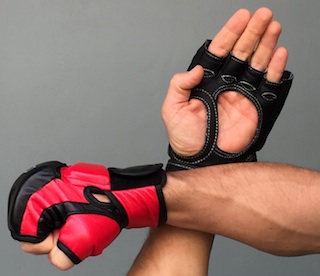If you want to be a great martial artist, you can’t just practice alone. That’s because the martial arts is ultimately about managing relationships.
Developing yourself by yourself is a path to confusion and delusion.
But what type of person is best for developing yourself? Who is the perfect sparring partner?
Consider this…
I was working out with Carl the other day. We started out at about 50%.
Suddenly, Carl jumped to 95%. He grabbed my head like an alligator and locked in a choke.
I thought he was going to break my neck.
Frantic, I tried to escape. My first move was weak. My second move was weaker. I was grunting and flopping around like a fish in a net.

It then occurred to me that Carl was toying with me. I mean, he could have let go, but he didn’t. He just held on as I burned myself out.
I tried one more desperate trick, but that didn’t work, either. I was stuck.
That’s when Carl ended it. He cranked my neck. I yelped–
OW!
He let go. “You all right?”
I rubbed my neck. “Yeah. That was great. Thank you.”
That’s it. End of story.
So, my question–as a training partner, was Carl a jerk or a gem?
The answer is gem. When I said, “Thank you,” I meant it.
In fact, Carl is what I would call the perfect sparring partner… and I’ve got four reasons why…
- Because even though Carl could have grabbed my head lightly and let it go without choking me, he stuck it to me to make sure I knew I was vulnerable.
- Because even though I thought he was going to break my neck, he didn’t.
- Because even though he could have cranked my neck and finished me right away, he gave me time to figure out an escape.
- Because when I yelped in pain, he let go and asked if I was all right.
Thanks to Carl, I went home with a memory. An experience. A lesson. There is no greater gift a training partner can offer than that!
Now, if you think that Carl was a jerk for making me say OW, I get it. But you’re wrong. Carl wasn’t a jerk because he only hurt me, he didn’t injure me.
In Help! My Sparring Partner is Out of Control, I said a bad training partner is someone who hurts you… but that’s not exactly true.
 As martial artists, we have to make a distinction between hurting and injuring. Hurting someone means they feel pain, but they’re able to keep training. Injuring means they feel pain and are not able to keep training.
As martial artists, we have to make a distinction between hurting and injuring. Hurting someone means they feel pain, but they’re able to keep training. Injuring means they feel pain and are not able to keep training.
Bruises, scratches, black eyes… they all hurt, but they don’t stop you from training. But broken bones, torn muscles, a scratched cornea… those will stop you from training.
So, to be precise, a bad sparring partner is someone who injures you. Yes, accidents happen… even the nicest person in class might injure someone. But I’m not talking about that guy.
I’m talking about the guy who injures you repeatedly. Or the guy who seems to injure everyone they work out with.
Do you know a guy like that? Stay away from him. That’s a bad sparring partner.
But be careful… don’t make the mistake of avoiding everyone who causes you pain or discomfort!
It may sound crazy, but so long as you’re not being injured, so long as you can keep training, the person who scares you and even hurts you is the one who will make you better.
You know who I’m talking about. That person in your class who makes you feel like, “Man—I don’t want to train with that guy. He goes too hard.” But be fair– has he ever injured you?
Hurt you, maybe. Scared you, probably. Roughed you up and made you feel like you suck. For sure. But if you’ve never had to miss class, then that’s him! He or she is the perfect sparring partner!
In fact, make that an official goal for yourself… your goal is to find training partners who practice in that sweet spot between safety and injury. Between improvement and abuse.
I’m not saying you should be in pain and fear every minute of class… but if a class goes by without making a memory, without having an experience, without learning a lesson, then what was the point of going to class?
It took me years to fully appreciate this way of thinking. When someone put me in a wristlock, or threw me, or hit me too hard, my first thought was, “What a jerk!” I hate this guy!” But over time, I realized that the problem was mine, not theirs.
Think about it—you don’t need to practice martial arts to learn how to deal with nice people, polite people, or kind people. The purpose of martial arts is to prepare yourself to deal with selfish people, rude people, and dangerous people.
And how do you do that? Hint— it’s not through kindness and comfort!
Look–you’re a nice person so I know you try to manage everyone with kindness and patience. That’s what nice people do. But what do you do when kindness and patience don’t work?
The biggest and most dangerous mistake nice people make is to keep trying kindness and patience even after those tactics have failed.
When kindness fails, you’ve got to train yourself to switch to a different tactic. You need to speak up, push back, and yes, if necessary, scare, hurt, or even injure the other guy. That’s the martial part. How you choose to do it is the art.
Now, this is where things get tricky. As martial artists, we all face a dilemma… how do you practice techniques designed to injure bad guys without injuring our training partners? How do you prepare for bad guys training with good guys?
You can’t really break arms, or cut throats, or gouge eyes… if we did, we’d all be dead or crippled! Instead, we find ways to make practice safe. But that becomes a problem when safety transforms into comfort.
If we remove the danger of martial arts to the point of never feeling scared, or weak, or incompetent, or overwhelmed, then we’ll be totally unprepared to deal with a real-life attacker.
That’s why I’d rather work out with a jerk who makes me feel uncomfortable than a nice guy who makes me feel comfortable. But don’t be fooled–there is a third choice…
A nice person who makes me feel uncomfortable. That’s the perfect sparring partner.
The only way to get better at scaring and controlling attackers in a real-life self-defense situation is to practice scaring and controlling your partners in class. To be a perfect training partner, you must be comfortable making the other guy feel uncomfortable.
Whether it’s a strike, a throw, a lock, a pin, you must allow yourself to force another human being—even a kind human being– into a position they don’t want to be in. Not because you’re a jerk or a bully, but because you’re a good partner.
It’s like making children eat their vegetables… they may not like it, but you know it’s good for them! If you don’t, you are actually doing your partners a disservice. You’re being a jerk in a different way.
Don’t just give your partners love… give them tough love.
Tough love doesn’t mean you don’t love, you just love in a smarter way.
Let me give you an example of how kindness can lead to disaster…
Partners are chosen for sparring. One of the two is bigger, stronger, or more advanced. Before sparring starts, the bigger guy leans over and says, “Don’t worry—I’ll go slow.”
AGHHH!
The big guy, who is only trying to be kind, has just announced that he will not be offering his partner his best technique. What good will that do?
If you throw slow, sloppy punches at your partner then you’ll only teach them how to defend against slow, sloppy punches!
Guess what—they don’t need to learn how to defend against slow, sloppy punches. That’s not being kind… that’s actually mean! Mean because you’re allowing your partner to develop bad habits and false confidence.
Your duty as a training partner is to make your partner better, not worse. Otherwise, what’s the point of training?
A perfect sparring partner doesn’t make themselves worse just so their partner feels better. Sure, you may not go full power and knock your partner over every chance you get, but you find moments to put on the pressure. To offer a challenge. To take your partner out of their comfort zone.
 That’s tough love! It’s tough love because when you give your partner your best, you know they may not like it or appreciate it. You know it’s going to take them time to understand how pressure–and even pain—will make them better.
That’s tough love! It’s tough love because when you give your partner your best, you know they may not like it or appreciate it. You know it’s going to take them time to understand how pressure–and even pain—will make them better.
But that’s what being a “sensei” is all about—you remember what it was like to be a beginner.
You remember which partners made you better. You know who taught you the most.
You acknowledge that it was the partners who ruffled your feathers and made you a little nervous that helped you break through to the next level.
Once you accept that tough love is the secret to good training, you won’t take offense at the sparring partner who goes hard, you’ll take offense at the partner who holds back.
So, there’s your challenge…
- The next time you work out with someone and you think they’re hitting too hard or throwing too fast, say thank you.
- The next time you work out with someone who makes you feel angry, disrespected, or frightened, say thank you.
- The next time you work out with someone who takes you to the edge of injury, but leaves you unharmed, say thank you.
If that’s hard to do, you need to make some adjustments. Maybe your perception of danger is inaccurate.
Maybe your triggers for feeling outraged or disrespected need to be re-calibrated.
Maybe it’s time to let go of your desire to always be comfortable and in control.
Forget maybe… it is time! Don’t let your fears and ego hold you back from learning what you need to learn to be your best.
Here’s another challenge…
I’d say the qualities that make up a perfect training partner are no different from the qualities that make up a perfect life partner– your wife, your husband, your someone special.
If you can manage a relationship with someone who disagrees with you, argues with you, makes you think twice about your beliefs, or calls you out for your shortcomings, then you are on the path to being your best on and off the mats.
I’m not suggesting you should seek out an abusive partner. Again, there’s a difference between pain and injury. If your partner is causing you damage and destroying your chances at leading a successful life, then get away from them.

But if the worst you can say about your partner is that they can be a real pain in the neck sometimes, perfect! If your special someone has a special way of driving you crazy, hang in there!
The next time you have a fight, say thank you. The next time you want to walk out or break up, say thank you.
Learning to control your temper, your breathing, and your words at home is no different than controlling yourself in the dojo or on the street. If you’re smart, you see everything as a training experience… which makes everyone your training partner.
So, if you find a good one, especially if they’re willing to train with you all day, every day, for life, hold on to them.
How to Be the Perfect Sparring Partner
Time for tips. How can you find the perfect sparring partner? How can you become the perfect sparring partner?
Tip #1: Communicate.
Don’t just show up to class, go through the motions, then pack up and head home. Talk to your partners!
Here are three questions I like to ask my partners during a workout…
1) “What are you working on?” Most of the time, they’ll just shrug and say, “Nothing,” which is crazy to me.
But sometimes, my partner may say, “I’m having a hard time blocking side kicks.” Great! Then I’ll throw more side kicks.
In the same way, I can tell my partner, “Hey, can you throw me some side kicks?” One simple request can help ensure that my workout goes exactly the way I need it to go.

2) “Mild, medium, or spicy?” Mild means I’ll go a little slower so they can work on something. Spicy means I’m not going to give you anything.
3) “Do you have an injury?” As a perfect sparring partner, you never want to cause or worsen damage. Ever.
I also let my partner know when I have an injury. That way, if I’m nursing a bad knee and my partner wants to work on leg locks, we can both avoid trouble by finding different partners.
Keep in mind, different partners want different things.
One person may want more pressure, one less. One may want to go faster, one slower. What should you do?
Your first duty is to do exactly what they want. That’s fine by me because I’ll learn no matter what.
Your second duty is to give them something they don’t want. Why? Because many students limit themselves by staying within their comfort zone. They want to always feel in control, refusing to push themselves into the unknown.
Don’t let that happen!
If you’re a perfect training partner, you believe in tough love. So, start your workout at a level that makes your partner feel comfortable… then increase the level to take them someplace new.
My training motto is simple…
Start low and slow, then see how far you can go.
Tip #2: Be honest.
Your partner throws you a punch… but it’s two inches short and off-center. That’s a dishonest punch. An honest punch would be in your face and deep enough to knock your head back.
If you practice ippon kumite or self-defense drills against dishonest punches, when a real punch comes flying your way, you’re going to be horrified to learn that your timing is off, your distance is off, your footwork is off, and that you never learned how to move your head properly!
Of course, your partner isn’t trying to screw you up… they think they’re being nice! They don’t want to hit you by accident. That’s why you have to take the responsibility to check their punch.
When you start a drill, tell them to throw you a punch… and see if it’s on target. If they don’t hit you, tell them, “Hey—throw me a real punch. And don’t worry– if I get it, it’s my fault, not yours.”
In return, when you throw a punch at your partner, give them an honest punch. Put it right where it should be. Why? Because you want them to learn how to slip, block, and move correctly.
Being honest also means that you react truthfully. If someone slaps a weak wristlock on you and you take a fall, you’re allowing your partner to build false confidence. Don’t do that!
Make sure your partner executes techniques correctly before you fall or tap. How else can they learn what works and what doesn’t if you fall down and tap every time they do something?
The flip side of this is to demand that your partner be honest with you. It’s okay to ask them, “Do you feel that?” “Did that really make you fall?”
As a side note, you shouldn’t really need to ask your partner when something is a hit or a miss because you should know. You should be honest with yourself!
Tip #3: Scare your partner, but don’t injure them.
Many people come to martial arts classes for fitness, friendship, or fun and don’t really care too much about fighting or self-defense. To me, that’s a shame because fighting is the secret sauce that makes martial arts more profound than yoga or dance.
Nothing reveals the real you like fighting.
Scaring your partner means taking them out of their comfort zone. Pushing them out of the known and into the unknown. Breaking them down so they can build back up.
When you put pressure on people, you force them to do things correctly. And in turn, when you allow your partners to put pressure on you, then you will do things correctly. That’s the deal between good partners.
So, my three tips for finding and becoming a perfect sparring partner in the martial arts…
Tip #1: Communicate. Ask what they want, tell them what you want. That’s how you can make sure you both get the most out of your training.
Tip#2: Be honest. If something’s not working, don’t pretend it is. Allowing your partner to build false confidence is the greatest sin a training partner can commit.
Tip #3: Scare your partner, don’t injure them. Shake them, hit them, pressure them, then guide them back to safety a little stronger and a little wiser.
Remember, if you’re always comfortable during training, you’re not doing it right. Always seek out the teachers and students who push you to the point of failure.
That’s right, I said, failure. Remember, to be a great master, you must first be a great student. To be a great student, you must keep learning. To keep learning, you must experience failure. To experience failure you must find a sparring partner who will keep you honest.
If you can’t find the perfect sparring partner, then you’ll have to build one. And the best way to do that is to become one.
So, lead by example. Be the perfect sparring partner and, sooner or later, your sparring partners will become perfect for you.
This article is a summary of Episode #38 of the Fight for a Happy Life podcast, The Perfect Sparring Partner.

Thanks for this great article! I just started doing private sessions specifically for sparring and had my second session yesterday. I have yet to scare my trainer, but I also have yet to be scared. In fact, my tendency is to move forward even when under attack (either I’m very brave or very stupid!) But since sparring is so new to me, any insights into it are more than appreciated!
Ha! Moving forward even under attack…? You and the Terminator have much in common!
Thank you for the comment, sir. And congrats on starting the new year in the ring! Go get ’em!
Very informative! Thanks Sensei Ando! Did you happen to see Putin taking his “opponents” down? He seems VERY comfortable 🙂 Think you should send him your post!
Ha! I will Putin to my list of role models. Thanks! 🙂
Very nice post, as always Sensei Ando ! I made it mandatory for the students at my dojo to read it. Thanks for being a beacon of wisdom (at least for me !).
Thank you, sir! I can not imagine a greater compliment. Happy training!
Ossu! Thank you! Just the title of your podcast a couple of days ago helped me get something in perspective. There’s someone who is very talented but needs to adjust down just a tiny smidge when dealing with someone who doesn’t have the same level of skill. I get hurt every single time, which is all of twice because this person lives out of state. This person feels horrible about it, by the way, so maybe things will change. But even if this person were a jerk or even if this person takes awhile to develop the skill to adjust down, it doesn’t change what I need to do. I need to develop my skills to eventually be a perfect sparring partner for this person. I just keep telling myself in the long term I will eventually gain enough skill to where this person and I will enjoy challenging one another. A milestone along the way to that goal will be the day when I’ve gained enough skill to not get hurt.
And just today I pulled my favorite stunt. If I get the sense during a drill that my partner is cuing off of Sensei’s count and not my attack, I will stay still and let my partner block air. I love seeing my partners improve instantly 🙂 Makes it more interesting for me, especially when they start doing it back to me 🙂
OSU, Jo! I love how you’ve turned pain into motivation to improve. It’s so much easier just to blame other people and drop out. (Then again, that guy sounds out of control, whether he feels horrible about it or not.)
Your stunt of striking off-tempo during drills is also a great example of how simple it is to keep each other honest. I’m sure they find it annoying… so keep doing it! 🙂 Thanks for the comment!
Ossu, and thank you for the compliments and for keeping us martial artists on track!
Ha! We all keep each other on track! 🙂
Thank you Ando Sensei – I LOVE this post! So many points to remember and think about, but the one that really jumped out was:
“The only way to get better at scaring and controlling attackers in a real-life self-defense situation is to practice scaring and controlling your partners in class”.
It made me realise (with a shock) that although I think of myself as someone who likes to “train hard” and “take risks”, all my training and mindset have always been about facing up to scary attacks from others, and defending myself. That’s very passive isn’t it? I don’t think I’ve ever genuinely scared anyone, or even tried to (not counting beginners if they are scared anyway – I mean people who can hold their own, and who would be harder to scare). So you have given me a lot to think about here.
On a related note, my sensei talks about controlling people with your kamae, and I think I will never really understand this. I can see when other people do it, but I don’t know what you have to do inside yourself to make it happen, if that makes any sense? Is this something you have ever thought about / taught . . . ?
Hi Kai! Thanks for dropping by!
Yes, you picked out such an important point… many of us focus on how WE feel practicing self-defense and not how we make the OTHER person feel. That’s trouble! Hopefully, that’s not how we approach ALL relationships! 🙂
As for controlling people with kamae, that is absolutely something I work on all the time. To me, the first project of martial arts is to control yourself… the second is to control others. I talk about that often when I teach in person, but not so much on the website. Some things are better felt than talked about. I also like knowing who I’m talking to! We can continue that conversation by email, if you wish. ando@senseiando.com
Happy training, Kai!
I would love that! thank you 🙂 this is something I absolutely want (need?) to learn more about but can’t seem to access. I will send you an email if that’s ok . . . ? Thanks again Sensei Ando.
Send away, Kai! 🙂